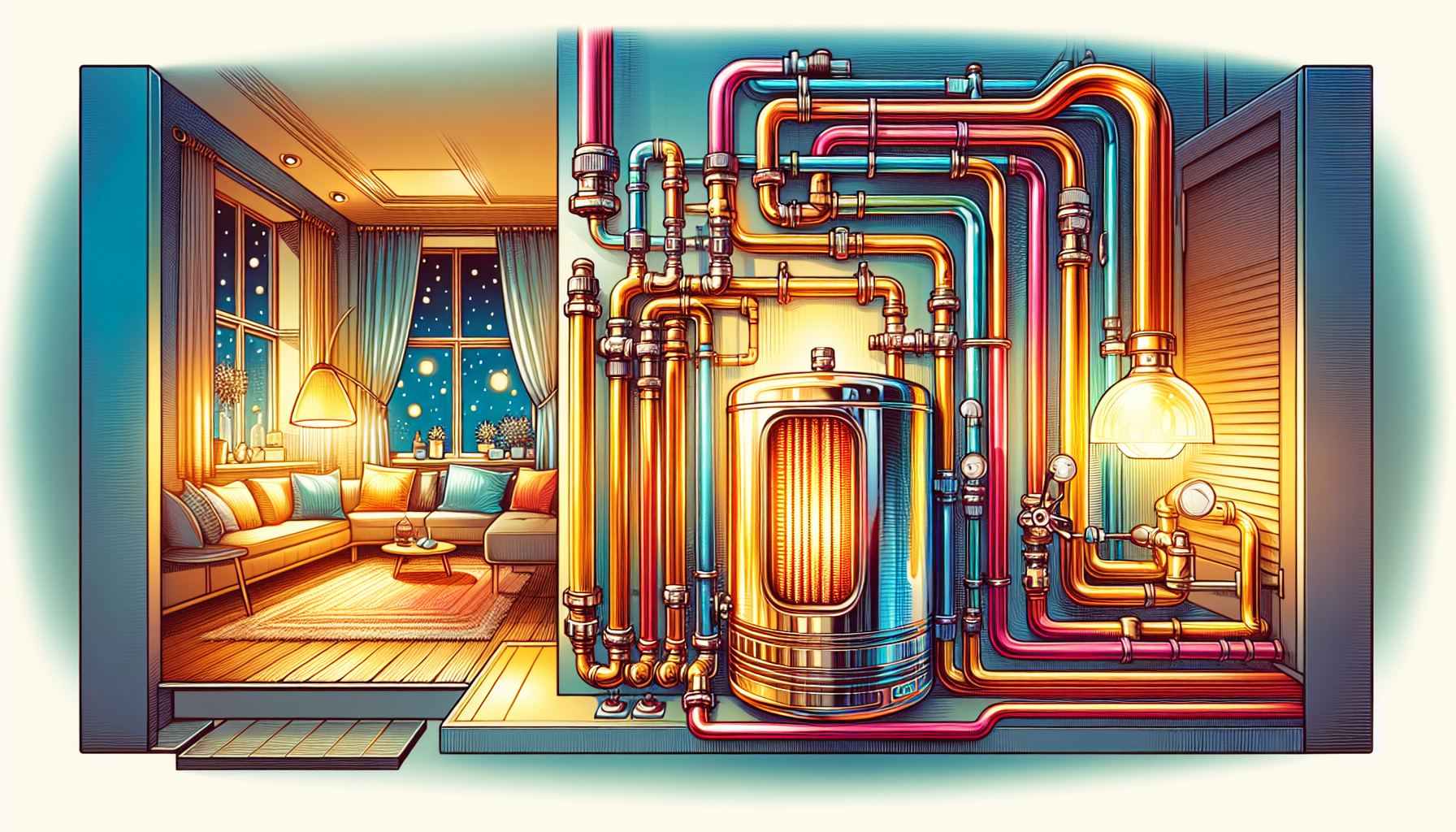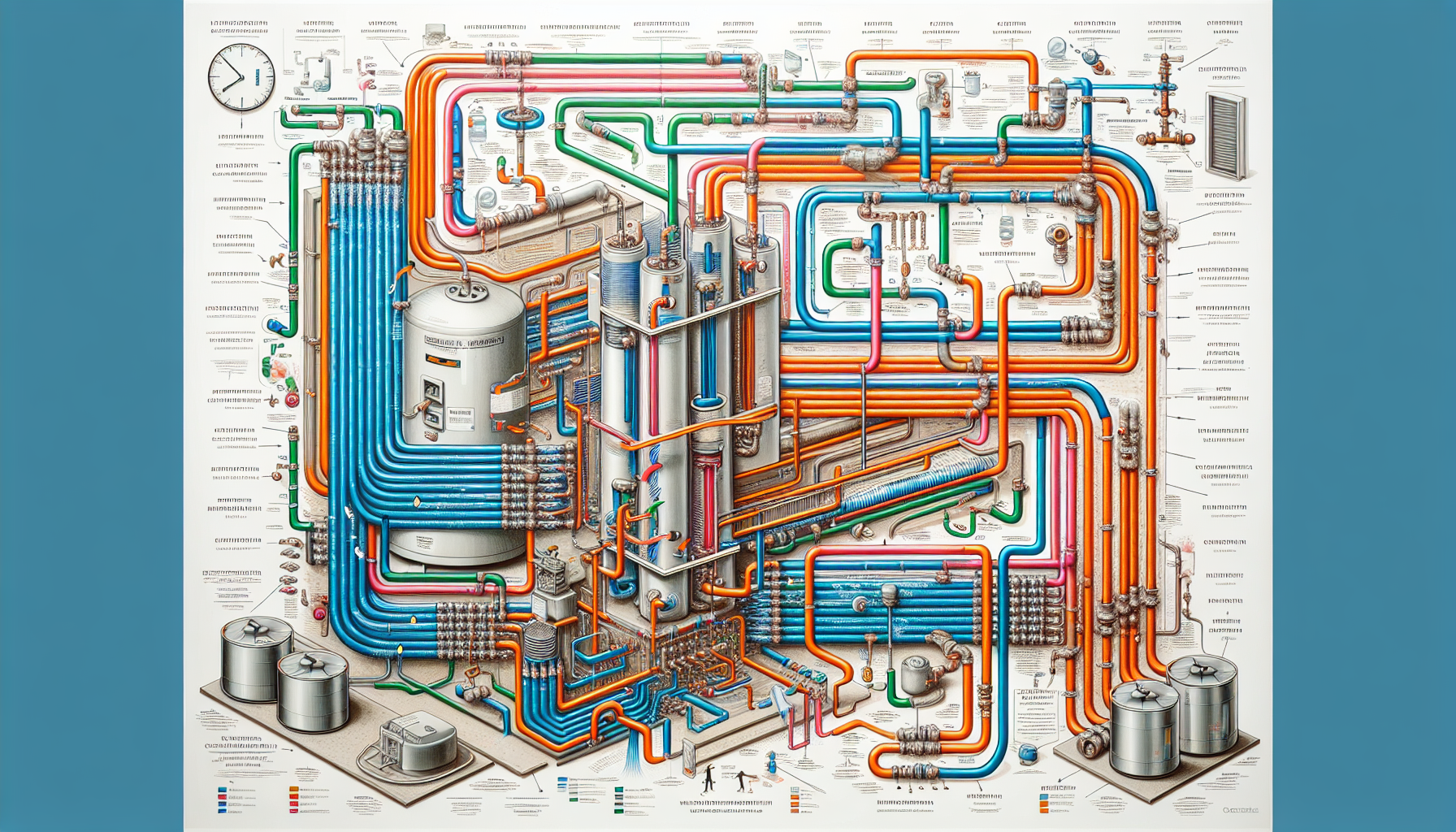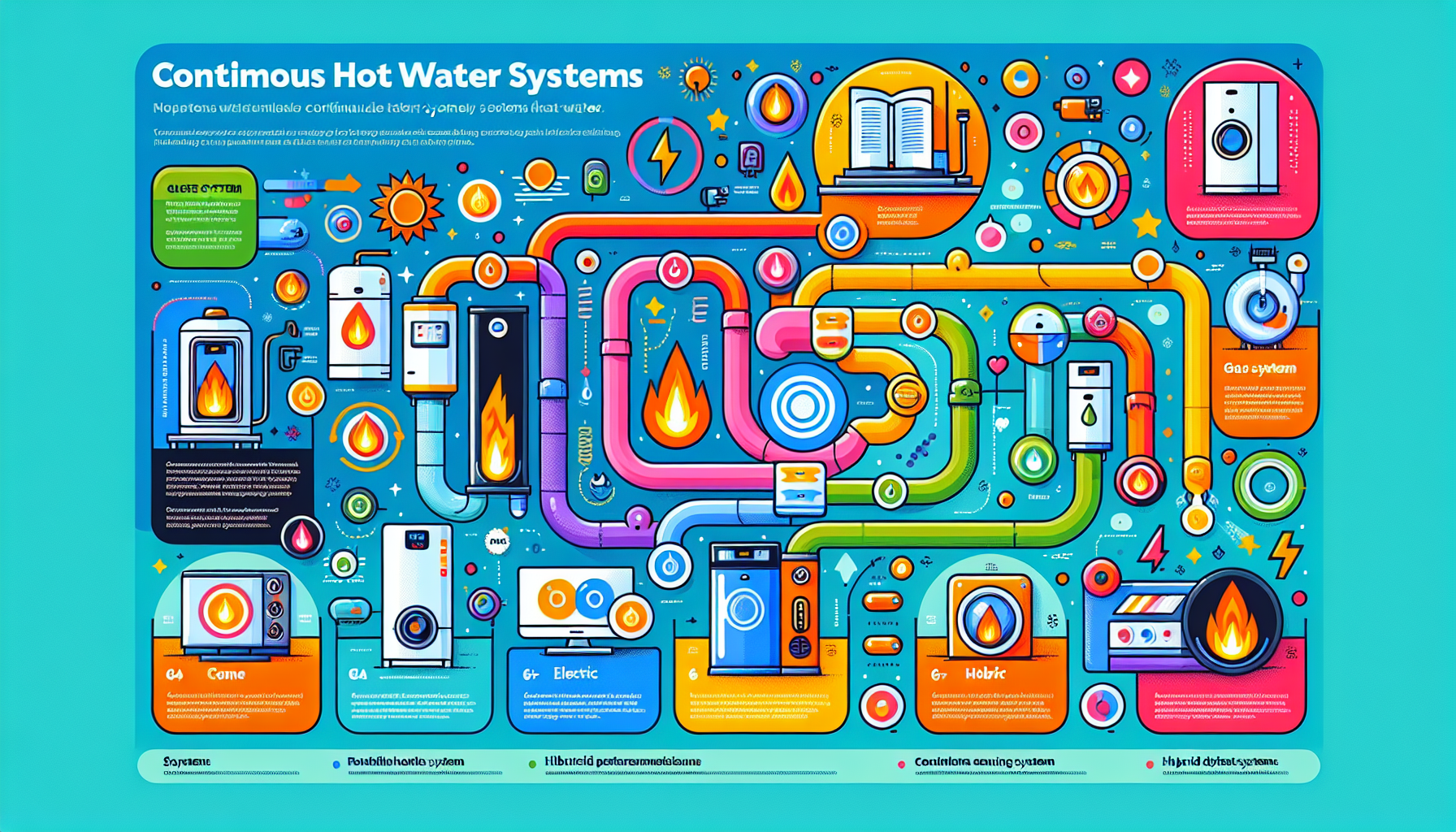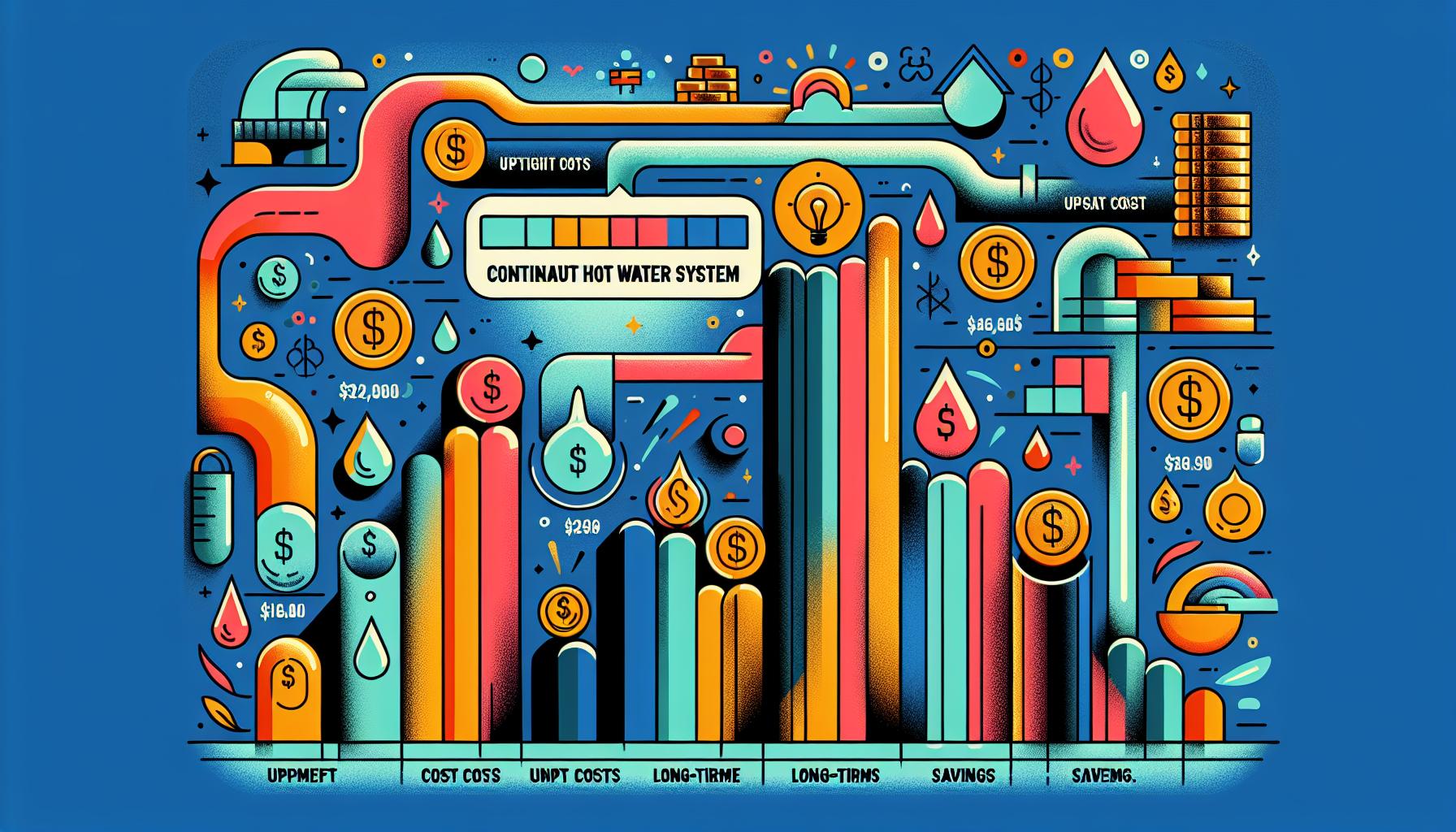Efficient and Reliable Continuous Hot Water System Options
A continuous hot water system provides on-demand hot water, helping you avoid the discomfort of running out. These systems are energy-efficient and eliminate the need for bulky storage tanks. This article explores various types of continuous hot water systems, their benefits, and offers guidance on choosing the best option for your home.
Key Takeaways
-
Continuous hot water systems provide energy-efficient solutions by heating water on demand, significantly reducing energy consumption and greenhouse gas emissions.
-
Choosing the right system involves assessing household hot water usage, with options including gas, electric, and hybrid systems tailored for different needs and efficiency requirements.
-
Proper installation and regular maintenance are crucial for ensuring longevity and optimal performance of continuous hot water systems, which can offer significant long-term savings on utility bills.
Efficient and Reliable Continuous Hot Water System Options

Switching to a continuous hot water system offers numerous benefits, including reduced energy consumption and environmental impact. These systems heat water on demand, eliminating the need for a storage tank and thereby reducing heat loss. Gas continuous flow systems, in particular, are renowned for their energy efficiency and ability to provide instant hot water, making them a great option for households that require a reliable and continuous supply of hot water.
Hybrid systems combine gas and electric heating methods to optimize energy use and enhance overall efficiency. Understanding your household’s hot water consumption patterns helps in selecting the most appropriate system. Considering factors such as size, flow rate, and energy efficiency ensures that your chosen system meets your household’s hot water demands effectively.
A new hot water system can significantly enhance your quality of life. Continuous hot water systems not only provide endless hot water but also contribute to lower greenhouse gas emissions. With the right system, you can enjoy the comfort of hot water on demand while also being mindful of your environmental footprint.
Introduction
The importance of a steady supply of hot water in daily life cannot be overstated. From the first tap in the morning to the last at night, hot water is a staple of modern comfort and convenience. Investing in a reliable hot water system is not just about comfort; it’s about enhancing the overall quality of life for you and your family.
Continuous hot water systems are designed to meet the high demand for hot water in homes and businesses alike. These instantaneous hot water systems ensure that you never run out of hot water, making them ideal for households with high hot water usage.
Various brands and models are available, making it crucial to find the right unit that fits your needs and budget. This guide will help you navigate through options like gas, electric, and hybrid models to make a well-informed purchase and ensure a smooth installation process.
Understanding Continuous Hot Water Systems

Continuous hot water systems have revolutionized the way we think about hot water supply. Unlike traditional tank systems that store and heat large volumes of water, these systems heat water on demand, ensuring a steady flow of hot water whenever you need it. This not only reduces energy consumption but also minimizes greenhouse gas emissions, making them a more environmentally friendly option.
Gas natural gas continuous flow systems, in particular, are highly efficient and provide instant hot water, eliminating the wait times associated with traditional systems. Hybrid systems take this efficiency a step further by combining gas and electric heating elements to optimize energy use.
Understanding your household’s hot water usage patterns helps in selecting the right system.
How Continuous Flow Works
Continuous flow systems operate by heating water on demand as it passes through the unit. When you turn on a hot water tap, cold water flows through heated copper pipes or a heat exchanger, where it is instantly heated by gas burners or electric elements, providing continuous flow hot water.
This process ensures a constant supply of hot water without the need for pre-heating or a storage tank, making these systems both compact and efficient.
Benefits of Continuous Flow Systems
One of the most significant advantages of continuous flow systems is their energy efficiency. Because they only heat water when needed, these systems avoid the standby heat losses associated with traditional storage tanks, leading to potentially lower energy bills. Their compact design also means they take up less space and require less maintenance, as there are no large tanks to deteriorate over time.
Additionally, continuous flow systems provide improved water quality by preventing rust and sediment build-up, which can occur in traditional tanks. The constant supply of hot water ensures that you never run out during use, providing a more convenient and reliable experience.
These systems also help reduce greenhouse gas emissions for households looking to lessen their environmental footprint.
Types of Continuous Hot Water Systems

Various types of continuous hot water systems are designed to meet different needs and preferences. The main categories include gas, electric, and hybrid systems, which provide a steady supply of hot water without a storage tank. These systems heat water directly as it is needed, reducing heat loss and making them more efficient than traditional hot water systems.
Each type has its unique benefits and considerations. Gas continuous flow systems are known for their cost-efficiency and ability to handle high demand, making them ideal for larger households. Electric systems, on the other hand, are often more environmentally friendly and easier to install. Hybrid systems leverage the strengths of both gas and electric heating to provide optimal performance and energy savings.
Gas Continuous Flow Systems
Gas continuous flow systems are popular for their lower operational costs and improved efficiency, especially in regions with a stable gas supply. These systems are designed to provide instant hot water on demand, ensuring a continuous supply without the need for a storage tank. This makes them particularly suitable for larger households or properties with high hot water usage.
The efficiency of gas hot water systems can lead to potential savings on energy bills, making them a cost-effective solution for many homeowners. With proper installation and maintenance, these systems can provide reliable hot water for many years, enhancing both comfort and convenience in your home.
Electric Continuous Flow Systems
Electric continuous flow systems are often praised for their environmental benefits, especially when powered by renewable energy sources. These systems only consume energy when heating water, making them more energy-efficient and reducing greenhouse gas emissions. Installation is typically simpler for electric systems as they do not require venting, unlike gas systems.
Electric continuous flow systems are easy to install and offer significant environmental benefits, making them attractive to eco-conscious homeowners. By choosing an electric system, you can enjoy the convenience of continuous hot water while also contributing to a more sustainable future.
Hybrid Systems
Hybrid systems integrate both gas and electric heating methods to enhance hot water availability and adaptability. These systems leverage the benefits of each element, ensuring efficient operation regardless of energy fluctuations. Hybrid systems optimize energy use and provide significant savings by automatically switching between gas and electric sources.
Users benefit from a continuous supply of hot water even during peak usage times, thus improving overall performance and convenience. The combination of gas and electric heating allows for a versatile and efficient solution, making hybrid systems an excellent choice for households looking to maximize their energy savings and hot water availability.
Choosing the Right Continuous Hot Water System for Your Home

Selecting the right continuous hot water system involves understanding the features and functions of different systems to make an informed choice. It’s essential to assess your household’s specific hot water needs, considering factors like the number of occupants and usage patterns.
Evaluating the size, flow rate, and energy efficiency of various systems ensures that your chosen unit meets your household’s demands. Comparing different brands and models based on energy ratings and customer reviews can also provide valuable insights into their reliability and performance, helping you make a well-informed decision.
Size and Flow Rate Considerations
Selecting the appropriate size and flow rate is crucial to meet your current household demands and accommodate potential future increases. The total number of hot water appliances and fixtures in your home directly influences the required size of the water heater. For households with simultaneous hot water usage, such as multiple showers, a continuous flow system is ideal.
Estimating your household’s peak water flow involves measuring the amount of water from each hot tap within a minute, allowing for better sizing of the system. By accurately assessing your hot water needs, you can choose a system that provides sufficient flow rate without compromising on pressure or temperature.
Comparing Brands and Models
When evaluating different hot water brands and models, checking their energy ratings can provide insight into their efficiency and potential savings. Customer reviews offer valuable information on the reliability and performance of various systems, helping buyers make informed decisions.
Combining insights from energy ratings and customer reviews helps compare various brands and models, ensuring you choose the best option for your needs.
Installation Insights: What You Need to Know
Proper preparation for installing continuous hot water systems involves selecting a well-ventilated and accessible location for maintenance. Installing a continuous hot water system typically requires a licensed plumber to ensure proper connections and safety standards. Annual inspections by qualified professionals are recommended to ensure optimal performance of the system.
Inspecting and cleaning the gas burner and pilot light can prevent ignition failure issues. By following these guidelines, you can ensure a smooth installation process and long-term reliability of your new hot water system.
Preparing Your Home for Installation
It’s essential to install the new hot water system in a well-ventilated area to ensure proper airflow and efficiency. For gas systems, proper ventilation is critical to prevent hazardous gas build-up during operation. Adequate space must be maintained around the installation site to allow for both maintenance access and to mitigate fire hazards.
Ensuring that the installation area is clear and leveled allows for easy access and maintenance after installation. By preparing your home adequately, you can facilitate a smoother installation process and ensure the longevity of your hot water system.
Professional Installation Process
Hiring licensed professionals for installation ensures compliance with local regulations and safety standards. Professional installers are familiar with local building codes and regulations, ensuring a compliant and safe installation of hot water systems.
This can prevent issues related to gas leaks, water leaks, and electrical hazards, providing peace of mind and long-term reliability.
Maintenance and Longevity
Continuous flow systems generally have a longer lifespan, with many lasting up to 20 years, which can offset their initial costs. Regular maintenance, such as annual flushing, helps prevent sediment accumulation that can decrease efficiency and lifespan. Ensuring the system is well-maintained can significantly enhance its operational efficiency and longevity.
Fluctuating water temperatures are a common issue in continuous hot water systems. These issues can often be linked to a malfunctioning thermostat, heating elements, or gas burner functionality. Addressing these issues promptly by checking and adjusting temperature settings, inspecting the thermostat and heating elements, and ensuring proper gas burner operation is crucial for system efficiency and reliability.
Regular Maintenance Tips
Regular upkeep can significantly enhance the lifespan and operational efficiency of a hot water system. For instance, replacing the anode rod every few years can prevent tank corrosion and extend the life of the system.
Adhering to a regular maintenance schedule ensures that your system continues to operate at peak efficiency and provides the perfect temperature whenever needed.
Troubleshooting Common Issues
Fluctuating water temperatures may indicate issues with heating elements or gas burner functionality. Inconsistent water temperatures can result from a poorly functioning heat exchanger or gas valve meter. To resolve these issues, check and adjust temperature settings, inspect the thermostat, and ensure proper gas burner operation.
Addressing these issues is crucial for maintaining the efficiency and reliability of continuous hot water systems.
Cost Analysis: Investment and Savings

Investing in a continuous hot water system can provide long-term financial benefits by reducing utility bills and improving energy efficiency. Initial costs range between $1,800 and $3,000, but these systems can last 15-20 years with proper maintenance, offering significant savings over time. This investment is not only about the initial expense but also about the long-term savings and energy efficiency over its lifespan.
Upgrading to a continuous flow system can achieve annual savings of up to $1,200, depending on household size and usage patterns. The energy efficiency of these systems, which heat water on demand, can reduce energy consumption by up to 75%, leading to lower utility bills and a smaller environmental footprint.
Upfront Costs and Installation Expenses
When evaluating hot water systems, consider both the initial purchase price and the long-term maintenance costs. Initial expenses for upgrading include the cost of the new system and necessary plumbing or electrical modifications. Professional installation, which varies based on complexity, is also a key factor to consider.
Some hot water system warranties require professional installation to remain valid, protecting the homeowner’s investment. Additionally, interest-free financing options can help manage the upfront costs, making the transition more affordable.
Long-term Energy Savings
One of the significant advantages of continuous flow systems is their energy efficiency, as they only heat water when needed, resulting in lower energy consumption. This design can lead to significant long-term savings on energy costs compared to traditional systems. Homeowners can save on utility bills by minimizing heat loss associated with traditional hot water tanks.
The anticipated savings from energy efficiency improvements are critical to consider during the upgrade process.
Upgrading to a Continuous Hot Water System
Transitioning to a continuous hot water system improves energy efficiency and reduces utility costs. These systems provide an endless supply of hot water, eliminating the need for a storage tank. Upgrading can lead to significant long-term savings on energy bills, making it a worthwhile investment.
Before installation, ensure that your plumbing and electrical systems can accommodate continuous flow technology. Hiring a professional for installation is recommended to ensure safety and compliance with local codes.
This ensures you can enjoy the benefits of a continuous hot water system while having a smooth transition.
Transition Considerations
Evaluating individual needs and budget thoroughly during the upgrade ensures the right choice of hot water system. Installation complexity varies significantly based on the existing plumbing setup when upgrading to a continuous hot water system.
Additionally, assessing gas supply availability is essential when upgrading to a gas hot water system.
Enhancing Home Energy Efficiency
Upgrading to a continuous flow system significantly improves energy efficiency in a home compared to traditional systems. These systems reduce household energy consumption and lower utility bills, making them an efficient and cost-effective solution.
By investing in a new hot water system, you can enhance your home’s energy efficiency and enjoy the long-term benefits of reduced energy bills with heat pump water heaters.
Financing Your Continuous Hot Water System
Government incentives or rebates may help offset some of the upfront costs associated with installing energy-efficient water heating systems. Various financing options, including interest-free payment plans, ease the financial burden of upgrading to a continuous hot water system. These options allow homeowners to spread the cost over time, making the expense more manageable.
Providers like Humm and Zip offer Buy Now, Pay Later plans specifically for financing continuous hot water systems. Approval for interest-free financing is often quick, making it convenient for homeowners looking to upgrade without high upfront costs.
Interest-Free Payment Plans
Financing options for continuous hot water systems can ease the upfront cost burden. Interest-free payment plans allow homeowners to upgrade their systems without incurring additional interest costs. These plans allow homeowners to invest in energy-efficient systems while avoiding high initial expenses, enhancing affordability and encouraging sustainable home solutions.
Budgeting for the Upgrade
Budgeting effectively for a hot water system can involve factoring in long-term savings from energy efficiency. Incorporating expected rebates and long-term savings into your budget significantly reduces the overall cost of upgrading your hot water system. Many hot water systems qualify for rebates, further assisting with the initial financial outlay.
By combining potential savings from energy efficiency and applicable rebates, you can create a more manageable budget for your new hot water system.
Summary
Switching to a continuous hot water system provides numerous benefits, including improved energy efficiency, reduced utility bills, and a constant supply of hot water. Whether you choose a gas, electric, or hybrid system, understanding your household’s hot water needs and evaluating the options available can help you make an informed decision.
Investing in a continuous hot water system not only enhances your comfort and convenience but also contributes to a more sustainable future. By choosing the right system and ensuring proper installation and maintenance, you can enjoy the long-term benefits of energy savings and a reliable hot water supply.
Frequently Asked Questions
What are the key benefits of continuous hot water systems?** **?
Continuous hot water systems offer instant hot water, enhanced energy efficiency, and reduced heat loss, leading to lower greenhouse gas emissions. These benefits make them a superior choice over traditional tank systems.
How do continuous flow systems heat water?** **?
Continuous flow systems heat water instantly by passing cold water through heated pipes or a heat exchanger, utilizing gas burners or electric elements. This ensures that hot water is available on demand without the need for a storage tank.
What factors should I consider when choosing a continuous hot water system?** **?
When choosing a continuous hot water system, it's essential to consider the system's size and flow rate, your household's hot water usage patterns, energy efficiency, and available space. Additionally, the type of energy supply, whether gas or electric, should also influence your decision.
Are there financing options available for upgrading to a continuous hot water system?** **?
Yes, you can explore financing options such as interest-free payment plans and government rebates to ease the upfront costs associated with upgrading to a continuous hot water system.
How can I ensure the longevity of my continuous hot water system?** **?
To ensure the longevity of your continuous hot water system, perform regular maintenance, including annual flushing and anode rod replacement. Promptly addressing issues like fluctuating water temperatures will further enhance efficiency and lifespan.




























